Ox Bel Ha cave system: the longest underwater cave in the world
Captivating the imagination of cave divers worldwide, the Ox Bel Ha cave system stands as breathtaking-inspiring evidence of the beauty and mystery of the underwater world. With its extensive network of passages and spectacular geological formations, it is a renowned destination for cave divers seeking a unique and exhilarating experience.
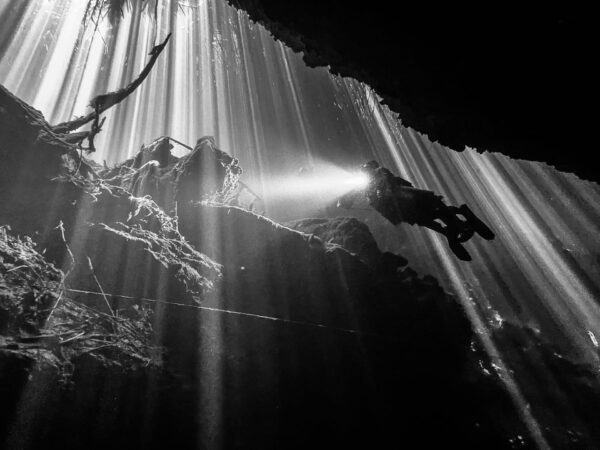
Ox Bel Ha has a fascinating history, remarkable features, ecological importance, and technical aspects of diving in this extraordinary underwater wonderland.
History of the Ox Bel Ha cave system
Situated just south of Tulum and close to the fascinating Sian Ka’an Biosphere Reserve, the Ox Bel Ha cave system was first discovered and explored in 1996 by a team of experienced cave divers.
Located on the Yucatan Peninsula in Mexico, this subterranean marvel stretches an impressive surveyed length of 435.8 kilometers (270.8 mi) of underwater passages, making it the longest underwater cave system in the world [January 2023].
Its name, which means “Three Paths of Water” in the Mayan language, perfectly encapsulates the complicated nature of this extraordinary geological formation.
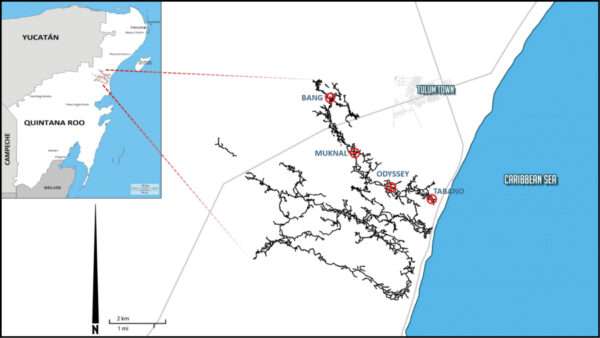
Geologically speaking, Ox Bel Ha encompasses several interconnected underwater cave systems, including 150 cenotes, including cenote Jailhouse, Cenote Corazon del Paraiso o Chupich, cenote Naharon, etc. The Yucatan Peninsula’s unique geological history, characterized by the dissolution of soluble limestone over millions of years, has given rise to an extensive network of subterranean passageways and cenotes, creating a paradise for cave divers and geology enthusiasts alike.
Underwater adventure
The Ox Bel Ha cave system, like many other cave systems in the Yucatan peninsula, offers divers a unique adventure through enchanting beauty. The unique characteristics of the caves around Tulum and close to the Caribbean Sea set it apart from other underwater cave systems. The crystal-clear turquoise waters provide excellent visibility, adding to the surreal experience of exploring this underground wonderland.
To dive through the labyrinth of Ox Bel Ha, Advanced cave diving techniques are a prerequisite, as the complex nature of the cave system demands a high level of skill, experience, and preparation. Navigational challenges are extensive, with multiple tunnels and intersections that can disorient even the most experienced cave divers. Proper cave diving training, progressive penetration, and equipment configuration are essential for a safe and successful dive.
Ox Bel Ha 2016 from JP Bresser on Vimeo.
Biodiversity and ecological importance of Ox Bel Ha
Beyond its geological marvels, Ox Bel Ha, like all underwater caves, is also home to many subterranean life forms. Adapted to the perpetual darkness and unique conditions of cave environments, these organisms have evolved fascinating traits that set them apart from their surface-dwelling counterparts. Rare and endemic species, some of which have yet to be discovered or fully documented, can be found within the cave system, making it an invaluable hotspot for scientific research and conservation efforts.
Recognizing the ecological importance of Ox Bel Ha, conservation organizations and local authorities have initiated various programs to protect the delicate ecosystems within the cave system. Regular research expeditions and monitoring initiatives aim to increase our understanding of these unique habitats and implement measures to ensure long-term preservation. Responsible cave diving practices, such as limiting contact with delicate formations and avoiding disturbances to wildlife, play a crucial role in maintaining the integrity of these fragile ecosystems.
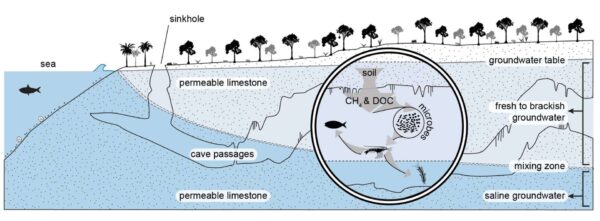
Caves within a subterranean karst estuary are filled with separated fresh (green), brackish (gray), and saline (blue) waters. Within the subterranean estuary, methane (CH4) and other forms of dissolved organic carbon (DOC) created during the decomposition of soil from the overlying tropical forest sustain a complex cave-adapted ecosystem.
It is worth noting that the Ox Bel Ha cave system is still being explored, and new species are regularly discovered and in other cave systems as well. The delicate and isolated nature of the cave ecosystem has led to the evolution of numerous unique and often endemic species, making it an exciting area for scientific research and conservation efforts.
Technical diving in Ox Bel Ha
To fully appreciate the wonders of Ox Bel Ha, technical diving skills are necessary. Cave diving certifications and specialized training such as stage cave and DPV cave diving are essential prerequisites for exploring the extensive passages and depths of the cave system. Proper planning and preparation are critical aspects of any dive, with gas management and decompression considerations being paramount.
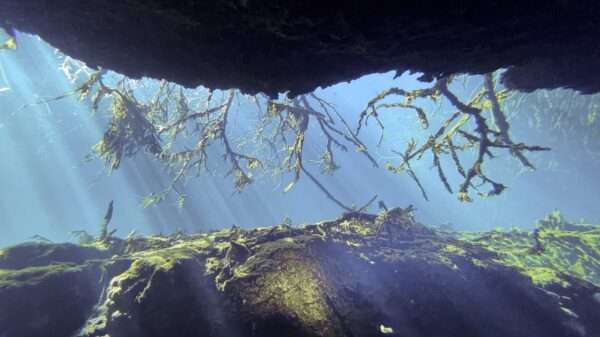
Emergency procedures and contingencies should be meticulously thought out and rehearsed, as the remote nature of the cave system may pose unique challenges in case of an incident. Safety protocols should always be followed to mitigate potential risks.
Exploring the hidden wonders
Within the vast expanse of Ox Bel Ha, several special sections beckon adventurous divers to uncover their hidden wonders. With its majestic opening and beams of light penetrating the water, the Yax Chen entrance offers a stunning start to the underwater journey. Beyond the known boundaries, unexplored passages promise further discoveries, enticing intrepid cave divers to push the limits of exploration and expand our knowledge of this unique cave system.
Inspiring Tales of Exploration and Discovery
The Ox Bel Ha cave system has witnessed numerous expeditions by dedicated cave divers, resulting in captivating stories of exploration and discovery. Experienced divers have recounted their breathtaking encounters with previously unseen formations, hidden chambers, and unique geological features. Their firsthand accounts not only provide a glimpse into the sheer beauty of the cave system but also highlight the importance of ongoing exploration in cracking its mysteries and expanding our understanding of the geological and ecological processes at play.
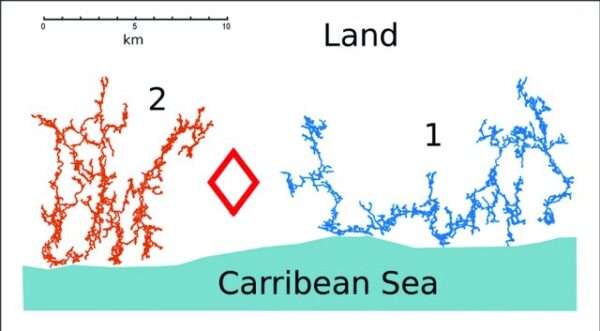
Cave divers’ maps of (1) the Sac Actun system and (2) Ox Bel Ha. The diamond symbol represents the location of the town of Tulum, and the coastline is sketched. Source available here
Some historical data about the exploration: Sistema Ox Bel Ha: Quintana Roo’s newest giant By Christophe Le Maillot
Some articles from the primary explorers: Laying Line in Ox Bel Ha By Emőke Wagner, László Cseh and Bjarne Knudsen
Responsible cave diving tourism
As more divers are drawn to the appeal of Ox Bel Ha and other cave systems, it is crucial to promote responsible tourism practices to ensure the long-term sustainability of the cave systems. Limiting the impact on the delicate cave environment should be a priority for every diver. Avoiding unnecessary contact with formations, respecting boundaries, and following established guidelines are vital in preserving the natural integrity of the caves. Additionally, showing respect for the cultural and historical significance of the cave system and supporting local communities and conservation efforts fosters a harmonious relationship between divers and the local environment.

Cenotes are in remote locations; the more remote, the more we can enjoy nature and wildlife. You can easily understand that no garbage truck will ever collect your trash even when a garbage bin is present: Bring your trash back to town.
Ox Bel Ha still has lots to offer
The Ox Bel Ha cave system is a testament to the marvels of the underwater world and the boundless possibilities that await adventurous divers. With its title as the longest underwater cave system in the world, it continues to captivate explorers with its intricate passages, breathtaking geological formations, and diverse ecosystems. As we venture into this subterranean wonderland, let us do so with a deep appreciation for its splendor, a commitment to responsible diving practices, and an insatiable curiosity to uncover the hidden treasures within Ox Bel Ha’s mysterious depths.





